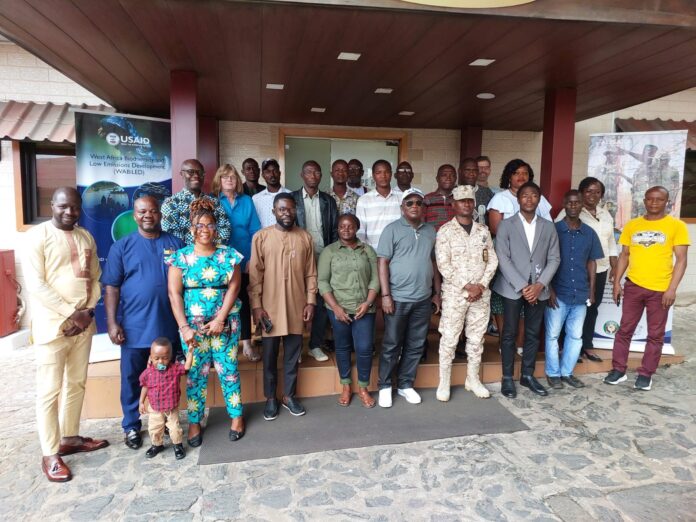
Monrovia, November 30, 2023 – The government of Liberia, through the Forestry Development Authority (FDA), in collaboration with the United States Agency for International Development (USAID), held a comprehensive training workshop aimed at empowering private sector actors to engage combatting wildlife crime.
The workshop brought together stakeholders from key finance and transport companies working at seaports and airports, as well as law enforcement agencies. This training initiative is a replicate of a similar workshop recently held in Lagos, Nigeria.
The Monrovia workshop brought together over 26 participants from private sector and law enforcement agencies, within the framework of the ECOWAS’s West Africa Strategy to Combat Wildlife Crime (WASCWC). The primary objective of the training workshop was to enhance the awareness of wildlife trafficking and the role finance and transport sectors play in tackling this illegal threat, a growing concern in West Africa, and to introduce tools and mechanisms to help counter this trade.
Wildlife trafficking currently stands as the fourth largest illegal global trade, posing a significant threat to the economic, social, ecological, and sustainable food security of nations in the region. The same routes used to traffic wildlife are often used for smuggling weapons, laundering money, and trafficking drugs and people.
The training aimed to bolster the capacity and capabilities of private sector actors and law enforcement agencies to identify, document, investigate, prosecute and report wildlife crimes, guided by the principles of the Convention on International Trade in Endangered Species of Wild Fauna and Flora (CITES).
Key topics covered during the workshop include wildlife trafficking trends and methods, money laundering, human rights considerations in wildlife enforcement, cooperation with law enforcement, and reporting suspicious activity.
Organized by USAID’s West Africa Biodiversity and Low Emissions Development (WABiLED) program, the training also provided a platform for participants to share best practices in combating wildlife trafficking.
Blamah Goll, CITES focal point for Liberia, emphasized the significant role Liberia plays in the national and regional contexts: “Liberia is blessed with an abundance of wildlife but has also suffered from the illegal wildlife trade in recent years. This training is a big statement that we are using as behavioral therapy that helps people reverse this situation, curtail issues and protect the country’s biodiversity.”
This workshop model will be replicated in other West African countries, including Togo, Côte d’Ivoire, and Ghana. The overarching goal is to streamline and strengthen the region’s capacity to combat wildlife crime.
About WABiLED
The West Africa Biodiversity and Low Emissions Development (WABiLED) Program is a four-year program funded by the United States Agency for International Development (USAID) with three main objectives: combat trafficking wildlife and improve the conservation of great apes; reduce deforestation, forest degradation, and biodiversity loss in key transboundary landscapes; and reduce greenhouse gas emissions and increase carbon sequestration derived from forest and land use.





















